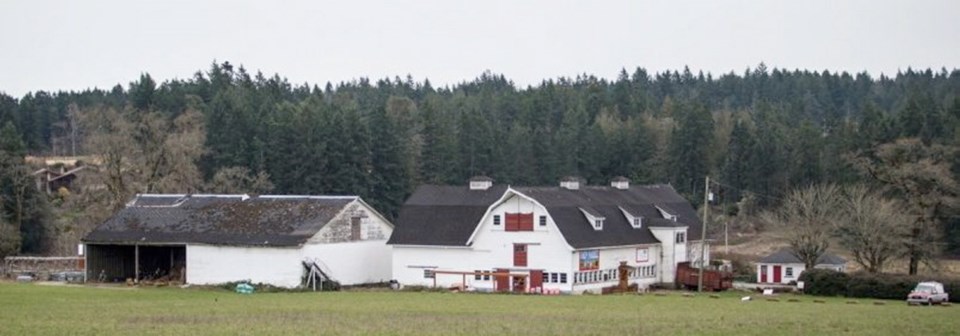The province has bought 78-hectare Woodwynn Farms in Central Saanich for use as a therapeutic recovery facility for people dealing with substance abuse and mental-health challenges.
There will be no housing on Woodwynn lands. Instead, people receiving help at the farm will live in off-site supportive housing.
“This type of support is proven to increase people’s ability to maintain their housing and eventually move on to independent living,” Minister of Municipal Affairs and Housing Selina Robinson said on Wednesday.
The announcement of $6.9-million in spending comes as B.C. communities struggle with rising numbers of homeless citizens, high numbers of opioid deaths, mental health issues, and shortages of affordable and supportive housing.
Providing a secure home, a supportive community and sense of value is “so important to the journey of recovery,” said Minister of Mental Health and Addictions Judy Darcy.
Tent cities have sprung up on Vancouver Island and the Lower Mainland, creating high-profile illustrations of the scope of problems facing communities.
Woodwynn Farms, with its eye-catching white barns, is in the 7700 block of West Saanich Road.
The province made the purchase after a previous non-profit treatment program at the farm collapsed. The Creating Homefulness Society bought the property a decade ago with the intent to run an on-site therapeutic program. But it never paid any money on its $4.6-million mortgage and the lenders moved to foreclose this year, prompting the sale of the farm.
Critical to the earlier program’s success was on-site housing, which was not approved by the municipality or the Agricultural Land Commission. That housing was supposed to generate income for the farm. In the end, the number of participants dwindled to a handful living in trailers, which were deemed unsafe by Central Saanich.
Neighbours complained of fire hazards on the farm, saying it had not been properly maintained.
B.C. Housing, the Ministry of Mental Health and Addictions, and the municipality of Central Saanich are planning to work together to craft a long-term plan for the property.
The farm plans will fall within local bylaws and abide by Agricultural Land Reserve designation, the province said in a statement.
B.C.’s $6.9-million expenditure covers the $5.8-million land cost — the farm is appraised at $6 million. Another $1.1 million goes to renovations, fees and “soft costs.” Soft costs are non-construction expenses and can include consultant reports and designs.
Society chairwoman Teri DuTemple said the $5.8 million will pay off all the society’s debts, with possibly about $100,000 left over.
Along with the mortgage, interest and bills, the society will be repaying two grants that it received for specific projects. Grant money was not used for its intended purpose. One case was renovation of the main barn.
The society had already laid off its staff, closed its market and sold its livestock prior to the land sale.
She described the sale as “good news on all fronts,” and said she is “thrilled” with the province’s vision for a therapeutic community on the property. “Ideally we would love to be involved with them at some point on that.”
Woodwynn neighbour Karen Harris said: “I am delighted that the land is going to be farmed and many of our concerns will be addressed because we have all lived in fear of fire for the years that it wasn’t hayed.”
Don Evans, Our Place Society executive director, said no plans have been drawn up for participation on the farm. He could see participants in Our Place’s own therapeutic program going to the farm, saying it fits with what the society is doing.
Portugal has 60 therapeutic communities, Evans said.
“We could certainly accommodate four or five on the Island.”
He would love to see a local therapeutic treatment program specifically for women, he said. Our Place has a therapeutic recovery program in View Royal for men.
cjwilson@timescolonist.com



